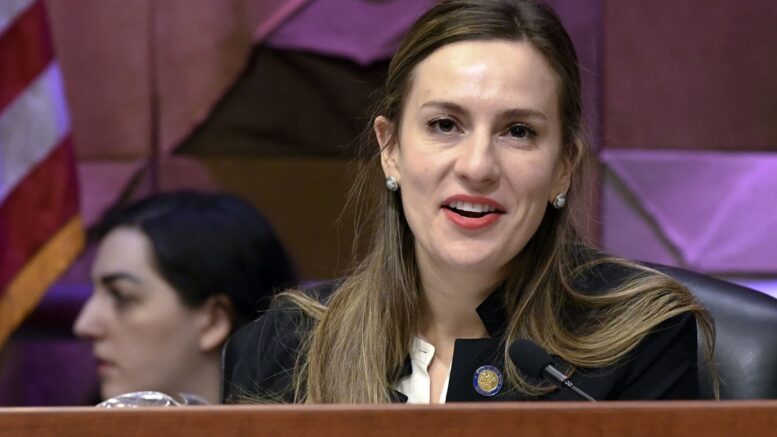For more than five hours Wednesday, the New York Senate Ethics and Internal Governance Committee discussed how to reform how the state government handles ethics investigations.
Several senators and witnesses said the ultimate solution was not reform but a complete teardown of the existing structure. Both Ranking Member Anthony Palumbo, R-New Suffolk, and Senate Finance Chairwoman Liz Krueger, D-Manhattan, said a constitutional amendment establishing a strong, independent review panel was essential. But Krueger conceded amendments can take years to enact in the state.
“There are statutory fixes we can do now,” she said.
Most of the Ethics Committee hearing dealt with the Joint Commission on Public Ethics (JCOPE) and its many failings, as pointed out by lawmakers, advocates for reform and even a former member.
Committee Chairwoman Alessandra Biaggi, D-Bronx, had a lengthy back-and-forth with JCOPE Executive Director Sanford Berland, who took on the leadership role in April.
At one point, Biaggi raised concerns about the commission’s recently enacted policy to make some information public about the investigations it conducts. The policy, approved at last month’s meeting and posted on its website, allows authorized staff to confirm that it has received a complaint, a case is pending or closed and a request from law enforcement to defer an investigation.
As it appeared Berland’s testimony was concluding, he clarified that there are additional criteria the commissioners established about releasing information but have chosen not to post that. He then added that he did not feel it was his place to comment on their decision.
That led Biaggi, who just a moment prior said she had no more questions, to follow up on that. Flabbergasted, she said their conversation was “zigging and zagging” on matters she and others believe call for clarity.
“I think part of what has been the main criticism of JCOPE is that there is an appearance or a perception by the public, by the Legislature, by others, by good government groups that essentially JCOPE is making ad hoc decisions,” she said. “And so, it’s not very clear what the lines are between staff making decisions and commissioners making decisions.”
An example of that “ad hoc” decision-making was its approval of former Gov Andrew Cuomo’s $5.1 million deal last year to write a book on his response to the COVID-19 crisis. After months of not disclosing, the Cuomo administration responded through open records requests that a JCOPE deputy counsel approved the book deal. That was contingent on no state personnel or resources being used in its development or promotion.
Another criticism of JCOPE is that many believe it’s not really an independent agency. The 14-member panel consists of six commissioners picked by the governor and lieutenant governor, six by majority party legislative leaders and two by the minority party legislative leaders. Each member serves a five-year term, with the governor appointing the commission’s chairperson.
The agency was created 10 years ago, during Cuomo’s first term under an agreement with then-Senate Majority Leader Dean Skelos and then-Assembly Speaker Sheldon Silver.
“It was a flawed model created and agreed upon by three people who have all left Albany under more than a cloud of ethics problems, two of whom were actually in jail. … So I don’t know why anybody’s surprised if it’s not working,” Krueger said.
Former commissioner Julie Garcia told the committee about what she endured during her time with JCOPE. She began her term in 2018 after being appointed by Assembly Speaker Carl Heastie, D-Bronx. In January 2019, the commissioners voted on whether to investigate allegations that an aide to then-Gov. Andrew Cuomo committed an abuse of state resources.
The next day, Garcia received a call from an aide to Heastie, who informed her that Cuomo was upset with how she voted.
Under state law, JCOPE votes are supposed to be confidential. Garcia would have faced misdemeanor charges if she revealed her vote. On Wednesday, she told the committee she purposefully never looked to see who selected the other commissioners because she didn’t want anyone’s actions to appear politically motivated.
“I really think it’s important when you’re talking about the Joint Commission on Public Ethics, if that commission’s not acting ethically, if someone’s committing crimes and leaking information to the former governor, I thought that was a pretty big deal,” said Garcia, who did file a complaint.
However, Garcia said she lost confidence in the process by the way her claim was handled. Months later, the inspector general’s report said it could not prove Garcia’s allegation that information was leaked.
She resigned from JCOPE in October 2019.
It was just happenstance that the committee held its much-anticipated hearing Wednesday. It was initially scheduled for July 12. However, concerns about members attending virtually and whether that violated open meeting laws forced its cancellation. Later that month, Biaggi rescheduled it to Wednesday.
When the hearing was supposed to take place, Cuomo was still entrenched in the governor’s office. By the time the hearing started, Cuomo had left office not even 36 hours before, and reports indicate JCOPE may consider rescinding its approval on the former governor’s book deal.
With Cuomo out and new Gov. Kathy Hochul calling for transparency, Biaggi said New York has never had “a more urgent moment” to implement meaningful ethics reforms.
“This is the end of a dark chapter in Albany, and we have an opportunity and a responsibility to set the tone to ensure restoring integrity in New York state government is a top priority,” she said.
This article was originally posted on New York lawmakers tackle thorny question How to implement real ethics reforms

Be the first to comment on "New York lawmakers tackle thorny question: How to implement real ethics reforms"